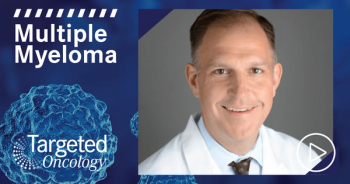
ALK inhibitors in Patients With NSCLC
Corey J. Langer, MD, from the Abramson Cancer Center, discusses recent advancements in treating an ALK mutation in patients with non-small cell lung cancer.
Corey J. Langer, MD, Professor of Medicine, Hematology/Oncology Division, University of Pennsylvania, Abramson Cancer Center, discusses recent advancements in treating an ALK mutation in patients with non-small cell lung cancer.
Even though only 4%-8% of patients with lung cancer have an ALK mutation, Langer says, there are four drugs that have demonstrated activity.
Currently crizotinib is the most widely used, Langer says, though it may not be the best ALK inhibitor.
A randomized phase III trial showed progression-free survival and response rates with crizotinib versus standard second-line chemotherapy.
The ALK inhibitor LDK378 had an initial response rate of 80% (which then dropped to 70%) in patients who had already received chemotherapy or crizotinib.
Langer says that ALK inhibitors and EGFR inhibitors cannot be compared. The EGFR inhibitor afatinib has demonstrated a response rate of up to 10% in patients who have received prior chemotherapy.
LDK378, the Ariad drug AP26113, and the Chigai drug AF802 are all generating response rates that are in high double digits, Langer says.
Clinical Pearls
- Even though only 4%-8% of patients with lung cancer have an ALK mutation, there are four drugs that have activity
- The ALK inhibitor crizotinib tested better in a clinical trial when compared to standard second-line chemotherapy
- ALK inhibitors LDK378, AP26113, and AF802 are all generating response rates in the high double digits







































